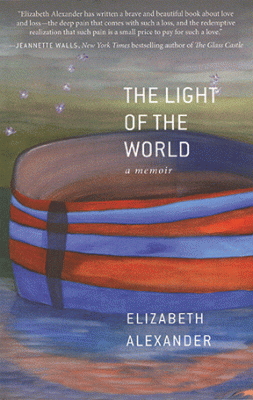A husband’s sudden death leads to a poignant meditation on loss.

THE LIGHT OF THE WORLD: A Memoir
By Elizabeth Alexander Gr’92
Grand Central Publishing, 2015, $26.
By Maureen Corrigan | Elizabeth Alexander is not one to balk at taking on difficult writing projects. She’s best known as the poet who composed “Praise Song for the Day” and read it at the inauguration of Barack Obama in January 2009. The whole world was watching and critiquing; the fact that she was a Pulitzer Prize finalist for her 2005 collection, American Sublime, mattered not a whit to the naysayers. But, as Robert Frost, Maya Angelou, and Miller Williams had before her, Alexander came through that particular trial by fire … only to confront another ordeal, much more personal and searing, in the spring of 2012. That was when her husband of 15 years, Ficre Ghebreyesus, died suddenly. He was 50 years old. Alexander, then the director of the African American Studies Program at Yale, was left a widow with two young sons to raise and a world to reassemble.
In The Light of the World, a memoir of her marriage to Ficre, his death, and her life in the aftermath, Alexander has steeled herself to take on another kind of difficult writing project—one that, by comparison, makes an “occasional poem” for a presidential inauguration look like a cakewalk. A reader witnesses Alexander grapple with language and strain for the right words and narrative form in the opening pages of this memoir, which contains a number of false starts:
“It begins on a beautiful April morning when a man wakes exhausted …”
“Or the story begins as he packs a tote bag with the usual slim thermos of strong coffee made in an Italian stovetop moka pot …”
“Or it begins with his surprise fiftieth birthday party, four days before he died … ”
No wonder Alexander stumbles. To begin the story of her life with Ficre is, inevitably, to experience his loss all over again. And one measure of her triumph in these pages is the vivid presence of Ficre, who had been a successful chef and artist. The first time she saw his paintings, Alexander recalls, they struck her as “mostly large dark canvases lit with brilliant corners of insistent life.” That’s not a bad way to characterize this book: infused with grief, yet shot through with the remembered joy of a happy marriage to a man alight with interests.
The other triumph of Alexander’s memoir is its richly allusive style. “Poetic logic is my logic,” she tells us as she describes abrupt sightings of what she now understands as harbingers of death: a predatory hawk; a quick red fox. Alexander shapes The Light of the World—the title comes from a poem by Derek Walcott—out of telling images (maps, Japanese maple trees, hot pink shirts), odd dreams, bits of conversation, and recipes (Ficre’s Bolognese sauce and his signature dish, Shrimp Barka).
Alexander met her future husband in 1996 in New Haven, and by the end of a dizzying six-week courtship they had decided to marry. “He was,” she writes, “a bottomless boat and the boat that would always hold me.” Their sons, Solomon and Simon, were born in short order, and Alexander summons up a vision of a life together in their “tan stucco Arts and Crafts-style house surrounded by a magic garden” that brims with houseguests, impromptu dance parties, art, and plenty of good food.
It’s a good life that was hard won in Ficre’s case. He left Eritrea at the age of 16 and lived as a refugee in Sudan, Germany, and Italy before coming to the United States. “He is a man who has drunk his water,” Ficre’s mother told Alexander, meaning that he was “sated” with adventure and would be content with a life that revolved around work, home, and family.
On the day of Ficre’s death, Alexander attended a late-afternoon Kabbalah reading at Yale. (“You have to hear the sacred poetry of the Kabbalah!” Alexander recalls him saying to her. “You are an artist, and you need it—I will take the children to the orthodontist!”) When she arrived home that evening, her younger son, then 12, ran downstairs to fetch his father, who had been exercising on the treadmill—only to discover Ficre on the floor, dead of a heart attack. Alexander would later find stacks of lottery tickets in his desk and recall the strange urgency with which Ficre had told her, a few days before he died, “I have to win the lottery for you.”
Blurred months of shock and grief ensue. Alexander evokes the rending force of sudden death, the way it turns the everyday world strange. She describes sightings of Ficre on the edges of her dreams, “no narrative, just presence, like a mother by her fevered child’s sickbed.” Eventually, after the dreams become less sharp and the contents of Ficre’s studio are catalogued, Alexander and her boys leave that wonderful house to begin another life in New York. They have not “moved on” or “found closure”; the grieving has just shifted shape.
Towards the end of the memoir, Alexander, in a compelling instance of “poetic logic,” describes the accommodation she has made with Ficre’s death:
“When we met those many years ago, I let everything happen to me, and it was beauty. Along the road, more beauty, and fear and struggle, and work, and learning, and joy. I could not have kept Ficre’s death from happening, and from happening to us. It happened; it is part of who we are; it is our beauty and our terror. We must be gleaners from what life has set before us.
“If no feeling is final, there is more for me to feel.”




